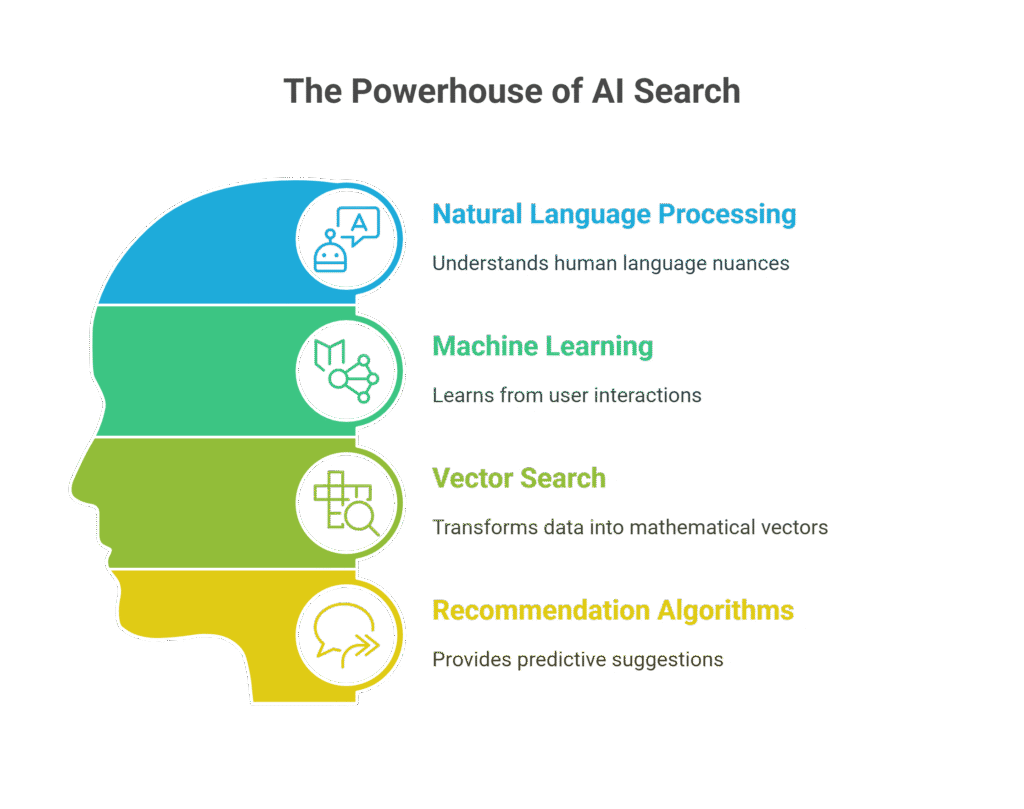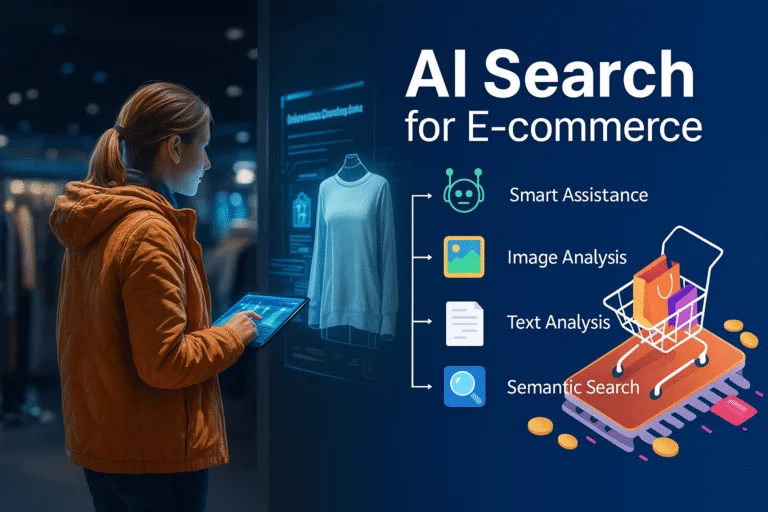Imagine a shopper typing “cozy gifts for a book lover” into your site search, and instead of a list of random mugs and socks, they’re met with warm throw blankets, book lights, scented candles, and bestselling novels.
That’s the difference between basic keyword search and AI search for e‑commerce.
In today’s fiercely competitive online marketplace, AI-powered search isn’t just a feature, it’s a growth engine. It elevates product discovery, personalizes results, reduces friction, and dramatically increases conversions. In this blog, we’ll break down exactly what AI search is, how it works, why it matters, and how to implement it seamlessly into your store.
What Is AI Search for E‑Commerce?
AI search refers to search technology that uses artificial intelligence—including natural language processing (NLP), machine learning (ML), and deep learning—to interpret, process, and respond to user queries with high relevance and intent-matching precision.
Unlike traditional search engines that rely on matching exact keywords, AI search:
- Understands context and synonyms
- Learns from shopper behavior over time
- Predicts user intent
- Offers dynamic, personalized results
This means users don’t need to search “just right” to find what they want. The engine does the thinking for them.
Core Technologies Behind AI Search
Here’s what powers AI search under the hood:

🔹 Natural Language Processing (NLP)
Allows the search engine to understand how people talk, not just what they type. It breaks down syntax, grammar, and context.
Example: “running shoes for flat feet” → understands both use-case and condition
🔹 Machine Learning (ML)
Learns from user interactions (clicks, purchases, bounces) to improve future search results. It enables ongoing result tuning without manual input.
🔹 Vector Search
Transforms products and queries into mathematical vectors, enabling semantic search that returns results based on meaning, not just word matches.
🔹 Recommendation Algorithms
Blends search with predictive suggestions. If a user searches “sneakers,” AI may recommend trending brands or frequently bundled items.
Why AI Search Is a Game-Changer for E‑Commerce
1. Improves Relevance & Reduces Friction
AI ensures shoppers don’t need to know your product taxonomy to find what they want. It interprets natural queries and delivers intent-aligned results.
“Something for mom who loves tea” → curated teapots, sets, accessories, maybe even cozy robes.
2. Enhances Personalization
AI search adjusts results based on past behavior, geolocation, device type, or preferences—no two shoppers see the same thing.
A returning user typing “summer jacket” may see different brands, sizes, or colors than a first-time visitor.
3. Combats the ‘No Results’ Dead End
By interpreting vague or non-standard terms, AI reduces “no results” pages that kill user experience and conversions.
“Shower speaker” may still return waterproof Bluetooth options even if that phrase isn’t in your product titles.
4. Drives More Conversions
When shoppers find relevant products faster, they buy more—and more often. Improved search UX can lift conversion rates by 20–50%.
5. Supports Omnichannel & Voice Commerce
AI enables consistent, intelligent search across mobile, desktop, and voice platforms (like Siri or Alexa), adapting to query style and tone.
Practical Use Cases of AI Search in Online Stores
- Fashion:
“Party dress under $100 for winter” → sorted by season, style, budget - Electronics:
“Best headphones for Zoom meetings” → noise-canceling, mic-enabled, highly rated - Furniture:
“Space-saving bed for small apartment” → multi-functional or foldable options - Beauty:
“Skin care for oily sensitive skin” → curated lists with matching ingredients and ratings
Real Results: What AI Search Can Do
| KPI Improved | Impact with AI Search |
|---|---|
| Conversion Rate | +20–50% |
| Bounce Rate | ↓ 30% |
| Time on Site | ↑ Engagement via relevant discovery |
| Average Order Value | ↑ More relevant product suggestions |
| Zero Result Rate | ↓ Up to 70% |
How to Implement AI Search in Your E‑Commerce Site
You don’t need a full data science team to deploy AI search. You need a smart tool that plugs into your stack.
Enter Expertrec
Expertrec is a no-code, AI-powered search engine built for e‑commerce businesses of all sizes. Here’s what it brings to the table:
- Real-time search suggestions based on user intent
- Voice search compatibility for mobile shopping
- AI-driven autocomplete and typo tolerance
- Behavioral re-ranking to prioritize popular or trending products
- Visual + semantic search for image-heavy or style-based browsing
- Detailed analytics on search performance and drop-off points
Whether you’re on Shopify, Magento, WooCommerce, or a custom-built platform, Expertrec provides fast, frictionless integration with scalable AI capabilities.
Conclusion: Smarter Search = Smarter Selling
Today’s shoppers expect relevance, speed, and personalization—and they won’t settle for anything less. AI search for e‑commerce bridges the gap between what users want and what your catalog offers.
By understanding intent, adapting to behavior, and constantly improving its recommendations, AI search doesn’t just improve UX—it increases loyalty, trust, and revenue.
And with solutions like Expertrec, implementing enterprise-grade AI search is easier and faster than ever.
Frequently Asked Questions
1. Can AI search help reduce cart abandonment?
Yes, by delivering better results faster, users are more likely to complete purchases without frustration.
2. Is AI search expensive to implement?
Not necessarily. Tools like Expertrec offer cost-effective, scalable pricing for small to enterprise-level businesses.
3. Does it work for all product categories?
Absolutely. AI search is effective across fashion, electronics, furniture, groceries, and more.
4. Can I track how AI search performs?
Yes, AI tools provide dashboards with key metrics like CTR, bounce rate, and zero-result queries.
5. Will it slow down my site?
No, most AI search platforms like Expertrec are built for speed and hosted separately to keep your site fast.




